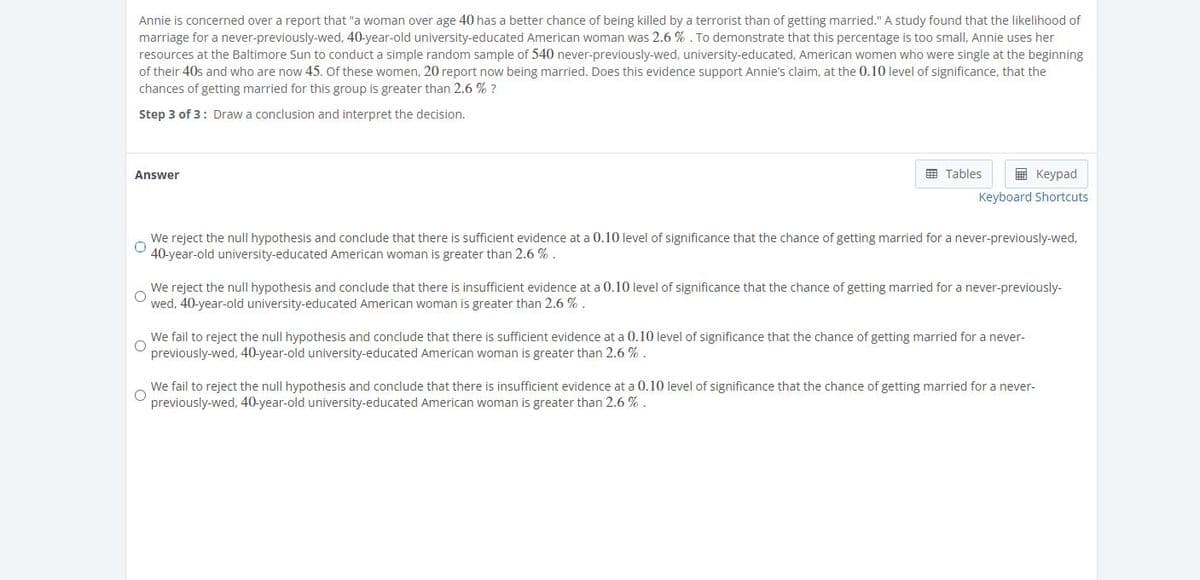e reject the null hypothesis and conclude that there is sufficient evidence at a 0.10 level of significance that the chance of getting married for a never-previously-wed. -year-old university-educated American woman is greater than 2.6 % . e reject the null hypothesis and conclude that there is insufficient evidence at a 0.10 level of significance that the chance of getting married for a never-previously- d, 40-year-old university-educated American woman is greater than 2.6 % . efail to reject the null hypothesis and conclude that there is sufficient evidence at a 0.10 level of significance that the chance of getting married for a never- eviously-wed, 40-year-old university-educated American woman is greater than 2.6 % . e fail to reject the null hypothesis and conclude that there is insufficient evidence at a 0.10 level of significance that the chance of getting married for a never- eviously-wed, 40-year-old university-educated American woman is greater than 2.6 % .
e reject the null hypothesis and conclude that there is sufficient evidence at a 0.10 level of significance that the chance of getting married for a never-previously-wed. -year-old university-educated American woman is greater than 2.6 % . e reject the null hypothesis and conclude that there is insufficient evidence at a 0.10 level of significance that the chance of getting married for a never-previously- d, 40-year-old university-educated American woman is greater than 2.6 % . efail to reject the null hypothesis and conclude that there is sufficient evidence at a 0.10 level of significance that the chance of getting married for a never- eviously-wed, 40-year-old university-educated American woman is greater than 2.6 % . e fail to reject the null hypothesis and conclude that there is insufficient evidence at a 0.10 level of significance that the chance of getting married for a never- eviously-wed, 40-year-old university-educated American woman is greater than 2.6 % .
College Algebra (MindTap Course List)
12th Edition
ISBN:9781305652231
Author:R. David Gustafson, Jeff Hughes
Publisher:R. David Gustafson, Jeff Hughes
Chapter8: Sequences, Series, And Probability
Section8.7: Probability
Problem 58E: What is meant by the sample space of an experiment?
Related questions
Question

Transcribed Image Text:Annie is concerned over a report that "a woman over age 40 has a better chance of being killed by a terrorist than of getting married." A study found that the likelihood of
marriage for a never-previously-wed. 40-year-old university-educated American woman was 2.6 % . To demonstrate that this percentage is too small, Annie uses her
resources at the Baltimore Sun to conduct a simple random sample of 540 never-previously-wed, university-educated, American women who were single at the beginning
of their 40s and who are now 45. Of these women, 20 report now being married. Does this evidence support Annie's claim, at the 0.10 level of significance, that the
chances of getting married for this group is greater than 2.6 % ?
Step 3 of 3: Draw a conclusion and interpret the decision.
Answer
囲Tables
国 Keypad
Keyboard Shortcuts
We reject the null hypothesis and conclude that there is sufficient evidence at a 0.10 level of significance that the chance of getting married for a never-previously-wed,
40-year-old university-educated American woman is greater than 2.6 % .
We reject the null hypothesis and conclude that there is insufficient evidence at a 0.10 level of significance that the chance of getting married for a never-previously-
wed, 40-year-old university-educated American woman is greater than 2.6 % .
We fail to reject the null hypothesis and conclude that there is sufficient evidence at a 0.10 level of significance that the chance of getting married for a never-
previously-wed, 40-year-old university-educated American woman is greater than 2.6 % .
We fail to reject the null hypothesis and conclude that there is insufficient evidence at a 0.10 level of significance that the chance of getting married for a never-
previously-wed, 40-year-old university-educated American woman is greater than 2.6 % .
Expert Solution
This question has been solved!
Explore an expertly crafted, step-by-step solution for a thorough understanding of key concepts.
This is a popular solution!
Trending now
This is a popular solution!
Step by step
Solved in 3 steps with 1 images

Recommended textbooks for you

College Algebra (MindTap Course List)
Algebra
ISBN:
9781305652231
Author:
R. David Gustafson, Jeff Hughes
Publisher:
Cengage Learning

College Algebra (MindTap Course List)
Algebra
ISBN:
9781305652231
Author:
R. David Gustafson, Jeff Hughes
Publisher:
Cengage Learning